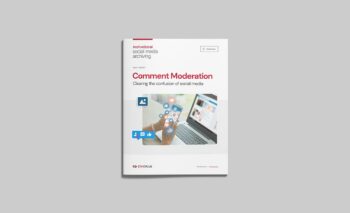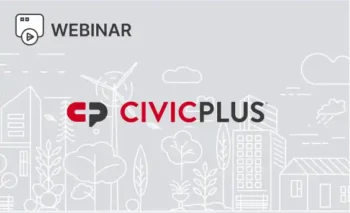First Amendment Fundamentals when Using Social Media
The First Amendment and Social Media
CivicPlus® (formerly ArchiveSocial) recently hosted a webinar, Social Media and the First Amendment, with Attorney Mark R. Weaver, which drew a crowd of public agency communicators from all over the United States. Weaver discussed how to avoid the inherent risks of having an online presence. He also addressed how the First Amendment and social media affect your agency and how to protect it from legal fees or lawsuits.
Mark Weaver is an experienced media law attorney who counsels public and private sector clients on crisis communications, social media, and litigation communications. Weaver owns Communications Counsel, Inc., a national communications consulting firm. He has three decades of experience working with clients all around the nation. Weaver has had multiple professional jobs in government, including Assistant Director of Public Affairs for the U.S. Department of Justice, Public Information Director for a large Pennsylvania municipality, and Vice President of a national communications firm in Washington, D.C. He has used his experiences to lecture around the country. Weaver has counseled private and public sectors on PR, media relations, social media, and crisis communications.
After the webinar, we compiled a crucial list of what the First Amendment gives protection on social media and what it doesn’t.
But first, what is The First Amendment?
The First Amendment of the United States stops the government from making laws or taking action that violates people’s freedom of speech. And when a government agency creates a forum for speech, the First Amendment comes into play. A traditional public forum has the strongest speech protection, and speech cannot be regulated in any way. Then, a limited public forum can be regulated with reasonable time, place, and manner restrictions. Most courts that have looked at this issue agree that government social media sites create a limited public forum. On social media, residents can voice their opinions using their freedom of speech rights, and the government hiding, deleting, or blocking comments based on viewpoint discrimination is likely unlawful. As a public agency, do you know what to do when a comment that’s contrary to your agency’s values appears on your feed? Do you know the dangers of violating First Amendment rights through comment moderation? We’ll reveal Weaver’s explanation of people’s First Amendment protections on social media vs. what isn’t covered under the First Amendment below.
What Social Media Content Does the First Amendment Protect?
You may be surprised by what has First Amendment protection online.
“The speech that bothers us the most typically has the greatest First Amendment protection,” Weaver explained. This includes false statements, and Weaver encouraged listeners not to “go down the route of deleting comments that are ‘misleading,’ since almost every comment can be misleading to someone.”
Anyone who claims their First Amendment rights are violated can sue your agency and you personally.
“The kind of lawsuits you will face with improper comment moderation on social media would be brought to federal court in the same way if you have discriminated against race,” Weaver told us. This is considered a serious violation of the Constitution, so it is essential to be careful when you want to delete or hide a comment on a government social media site.
What about Hate Speech?
Contrary to what you might expect, offensive speech gets the most protection. Offensive speech — one type of which is hate speech, should not be deleted in a comment on a government social media site. Deleting offensive or hate speech can get you and your agency in trouble. For example, if someone sees that their comments were unconstitutionally deleted or hidden (or that they were blocked), they have the right to sue in federal court. The Supreme Court and other federal courts have ruled that comments are protected in a limited public forum when the comments are offensive, hateful, or harassing. Unfortunately, “There’s no good working definition of hate speech that doesn’t include a subjective analysis by government officials which might change from agency to agency,” Weaver tells us. This type of speech on your government agency site might be frustrating, but you can’t legally take them down.
What doesn’t have protection under the First Amendment?
When moderating comments on social media as a public agency, knowing what isn’t protected under the First Amendment is crucial. In the webinar, Weaver lays out a list of eight essential things that don’t have First Amendment protection and, in most cases, can be deleted or hidden from government social media comments:
1. Obscenity
Obscenity presents itself in many different forms, but the most common form on social media is material harmful to minors or pornographic. Due to social media content rules and filtering, “you are unlikely to see this successfully posted on social media,” Weaver said.
Note: Profanity is not obscenity and is typically protected as free speech.
2. Defamation
“Defamation is the false assertion of a fact that causes damage to someone’s image,” Weaver explained. For something to be considered defamation, it must be false, an assertion of fact, and something that causes damage. Therefore, opinion statements cannot be defamatory and must not be deleted or hidden as defamation.
3. Actual Threats
The First Amendment does not protect an actual threat for various reasons. Online, this presents as “a communicated intent to inflict harm or loss on another,” Weaver said. It’s typically a crime and can be charged as such.
4. Spam
Spam comments are quite common on social media posts. To be considered spam, “it has to be something that has nothing to do with your topic, purpose as a business or nothing to do with the subject matter of the post,” Weaver explained. He cautions to apply this definition sparingly.
5. Illegal Activities
“If someone is using your page to commit a crime, attempt to commit a crime, or encourages others to commit a crime,” then it fits in this category,” Weaver said. It can be deleted or hidden. You should also alert law enforcement.
6. Malware Links
A malicious URL link is created with the intent of interfering with the workings of a computer or network. Weaver explained there is no First Amendment right to link to such a site.
7. Illegal Discrimination
Mark told us, “If someone comments in a way that obviously promotes or encourages illegal discrimination by your agency, it can be taken down.” There’s no First Amendment right to tell the government not to, for example, hire someone born in a particular country or of a specific religion.
8. Copyright
Copyright is intended to protect original creative work. “No one has the right to post something stolen from the creator of that work,” Mark said.
What About Your Social Media Policy?
Your social media policy means nothing if it’s not constitutional. Whether deleting/hiding offensive comments or blocking a user, you must abide by the law when doing so — even if you think you are acting according to your agency’s policies. You may be in serious legal trouble if your policy violates the First Amendment. That’s why educating yourself and the rest of your agency on these legal dangers is crucial.
Final Thoughts
It is crucial to remember that the First Amendment is in force when the government uses social media as a communications tool. You should train your employees, implement new policies, and hold team members accountable for their actions on social media. Weaver trains agencies around the country on this topic. Violating the First Amendment can have serious legal consequences. During the webinar, Social Media and the First Amendment, Weaver explained that knowing what is protected vs. what is not protected under the First Amendment is crucial to government social media success. This way, you can minimize the risks of having a presence and flourish on social media.
Interested in learning more about social media First Amendment Protection? Check out this helpful webinar recording:
- “Social Media and The First Amendment: Learning to Avoid Facebook Foibles and Twitter Trip-ups” Webinar Replay
Discover Even More About Social Media Compliance
Explore our Social Media Archiving software that helps your organization navigate legal compliance pertaining to public records and First Amendment protections.


